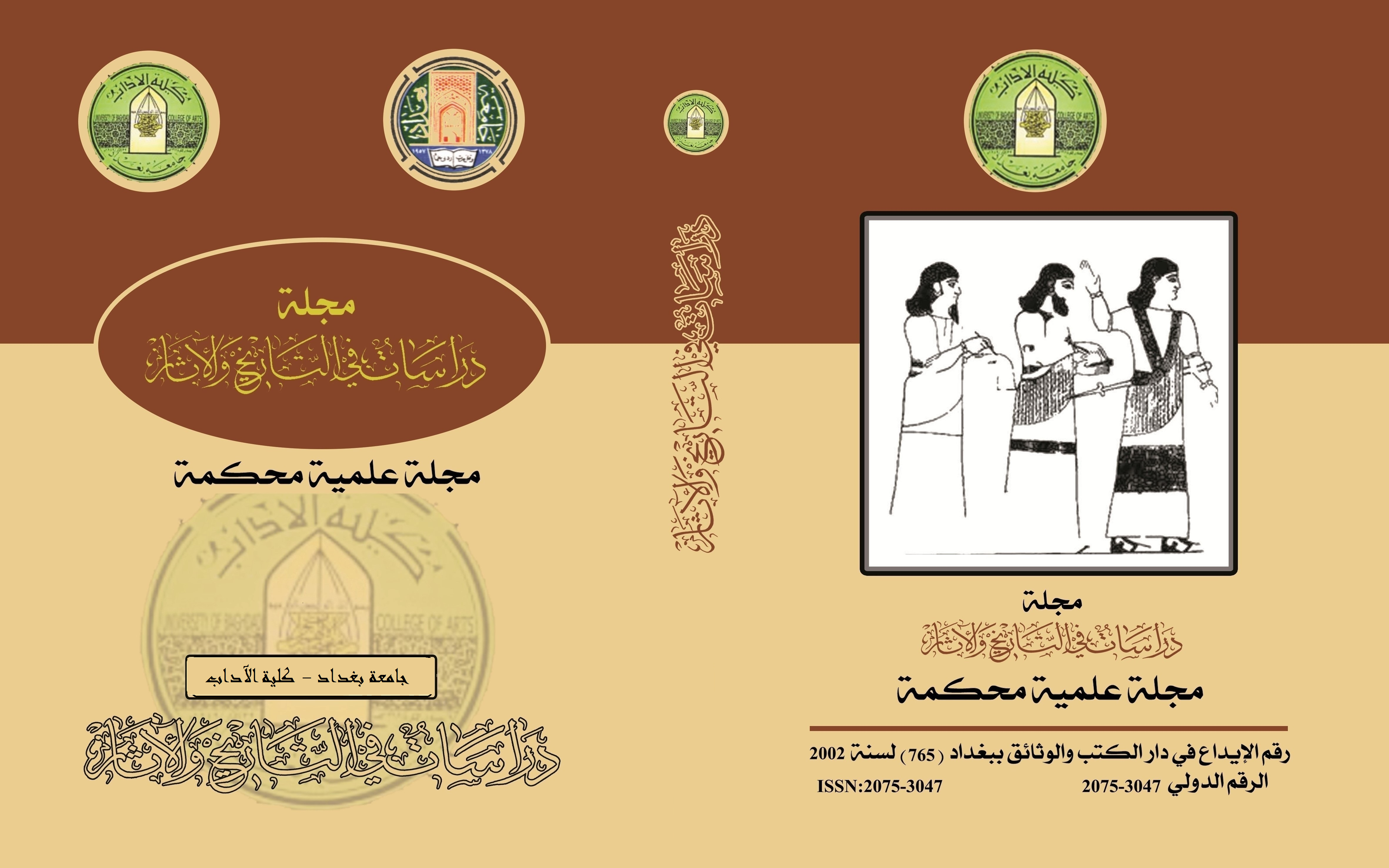نفوذ الترك على خلفاء بني العباس وأثره في قيام الإمارات المستقلة
الكلمات المفتاحية:
الخليفة المتوكل، الترك، العصر العباسي الثانيالملخص
مرت الخلافة العباسية للفترة (232-334هـ) في العصر العباسي الثاني بحالة ضعف وانقسام نتيجة تولي الخلافة خلفاء ضعاف مسلوبي الإرادة عملوا على إبعاد العرب والعناصر الأخرى وتقديم العنصر التركي في الجيش ومراكز السلطة وهذا ما أدى الى إضعاف الخلافة العباسية وجعل خلفائها في مهب الريح دون ناصر من أبناء جلدتهم ضد أي تمرد أو اضطهاد من تلك العناصر. فقد تسلط الترك على رقاب الخلفاء في هذه الفترة ولعبوا دوراً سلبياً في رسم الاتجاهات السياسية للدولة مما حط من هيبة الخلفاء وتضائل نفوذهم وبالتالي أدى ذلك الى عدم قدرة الخلافة في ترسيخ دعائم الحكم خاصة في ولايات الأطراف مما شجع ذلك على انفصال البعض منها، فقد ظهرت إمارات مشرقية وإمارات في المغرب. انفصلت عن المركز وحكمت ولاياتها حكماً ذاتياً ولائها للخلافة أسمي لا فعلي، فكانت هناك إمارات أو دول خدمت الدولة العباسية وأخرى كانت حركات انفصالية أضرت بالدولة العباسية وساهمت في إسقاطها.
المراجع
ابن الأثير: محمد بن عبد الواحد الشيباني (ت 630هـ)، الكامل في التاريخ، (بيروت، دار الكتب العلمية، 1965م).
ابن تغرى بردي: يوسف بن عبد الله (ت 874هـ)، النجوم الزاهرة في ملوك مصر والقاهرة (مصر، دار الكتب، 1963م).
الجاحظ: عمرو بن بحر بن محبوب الكناني (ت 255هـ)، رسائل الجاحظ السياسية، مناقب الترك (القاهرة، مكتبة الخانجي، 1964م).
حسن خليفة، الدولة العباسية قيامها وسقوطها، (القاهرة، المكتبة العربية).
الخضري: محمد بك، الدولة العباسية (القاهرة، مؤسسة المختار، 2003م).
ابن خلدون: عبد الرحمن (ت 808هـ)، العبر وديوان المبتدأ والخبر في معرفة أيام العرب والعجم والبربر، (بيروت، دار الفكر، 1988م).
ابن خلكان: شمس الدين أحمد بن محمد (ت 681هـ)، وفيات الأعيان وأنباء أبناء الزمان، (بيروت، دار صادر، 1971م).
الذهبي: شمس الدين بن عثمان بن قايماز (ت 748هـ)، الأمصار ذوات الآثار، تحقيق علي سعد، (الرياض، دار البشائر، 1986م).
العبر في خبر من غبر، (مصر، المكتبة التوفيقية، 1984م).
السيوطي: جلال الدين عبد الرحمن بن أبي بكر (ت 911هـ)، تاريخ الخلفاء (مصر، مطبعة السعادة، 1952م).
شوقي ضيف، العصر العباسي الثاني، (مصر، دار المعارف، 1973م).
الطبري: محمد بن جرير، (ت 310هـ)، تاريخ الرسل والملوك، (بيروت، دار التراث، 1966م).
ابن الطقطقي: محمد بن علي بن طباطبا (ت 709هـ)، الفخري في الآداب السلطانية والدول الإسلامية، (بيروت، دار القلم، 1997م).
طه عبد المقصود، موجز الفتوحات الإسلامية، (القاهرة، دار النشر للجامعات، 1983م).
عاشور: سعيد عبد الفتاح، دراسات في تاريخ الحضارة العربية الإسلامية، (الكويت، ذات السلاسل، 1986م).
عمر فلاح، حركة الزنج وأثرها على جنوب العراق، (مجلة الجامعة العراقية، العدد 54/2، 2022م).
فاروق عمر، فوزي، العباسيون الأوائل، (بيروت، دار الإرشاد، 1970م).
ابن كثير: إسماعيل بن عمر الدمشقي (ت 774هـ)، البداية والنهاية، (بيروت، مطبعة المعارف).
كرد علي: محمد، خطط الشام، (دمشق، مكتبة النوري، 1983م).
المسعودي: أبو الحسن علي بن الحسين (ت 346هـ)، مروج الذهب ومعادن الجوهر، (بيروت، المكتبة العصرية، 1993م).
مسكويه: أحمد بن محمد بن يعقوب (ت 421هـ)، تجارب الأمم وتعاقب الهمم، (طهران، مطبعة سروش، 2000م).
اليعقوبي: أحمد بن اسحاق بن جعفر (ت 292هـ)، تاريخ اليعقوبي، (بيروت، دار صادر، 1995م).
التنزيلات
منشور
إصدار
القسم
الرخصة

هذا العمل مرخص بموجب Creative Commons Attribution 4.0 International License.
:حقوق الطبع والنشر والترخيص
بالنسبة لجميع البحوث المنشورة في مجلة دراسات في التاريخ والآثار، يحتفظ الباحثون بحقوق النشر. يتم ترخيص البحوث بموجب ترخيص Creative Commons CC BY 4.0 المفتوح ، مما يعني أنه يجوز لأي شخص تنزيل البحث وقراءته مجانًا. بالإضافة إلى ذلك ، يجوز إعادة استخدام البحث واقتباسه شريطة أن يتم الاستشهاد المصدر المنشور الأصلي. تتيح هذه الشروط الاستخدام الأقصى لعمل الباحث وعرضه.
:إعادة إنتاج البحوث المنشورة من الناشرين الآخرين
من الضروري للغاية أن يحصل الباحثون على إذن لإعادة إنتاج أي بحث منشورة (أشكال أو مخططات أو جداول أو أي مقتطفات من نص) لا يدخل في نطاق الملكية العامة أو لا يملكون حقوق نشرها. يجب أن يطلب الباحثون إذنًا من مؤلف حقوق النشر (عادة ما يكون الناشر).
يطلب الإذن في الحالات التالية:
بحوثك الخاصة المنشورة من قِبل ناشرين آخرين ولم تحتفظ بحقوق النشر الخاصة بها.
مقتطفات كبيرة من بحوث أي شخص أو سلسلة من البحوث المنشورة.
استخدم الجداول والرسوم البيانية والمخططات والمخططات والأعمال الفنية إذا لم يتم التعديل عليها.
الصور الفوتوغرافية التي لا تملك حقوق لنشرها.
لا يطلب الإذن في الحالات التالية:
إعادة بناء الجدول الخاص بك مع البيانات المنشورة بالفعل في مكان آخر. يرجى ملاحظة أنه في هذه الحالة يجب عليك ذكر مصدر البيانات في شكل "بيانات من ..." أو "مقتبس من ...".
تعتبر عروض الأسعار القصيرة معقولة الاستخدام العادل ، وبالتالي لا تتطلب إذنًا.
الرسوم البيانية ، الرسوم البيانية ، المخططات ، الأعمال الفنية التي أعاد الباحث رسمها بالكامل والتي تم تغييرها بشكل ملحوظ إلى درجة لا تتطلب الاعتراف.
الحصول على إذن
لتجنب التأخير غير الضروري في عملية النشر ، يجب أن تبدأ في الحصول على أذونات في أقرب وقت ممكن. لا يمكن لمجلة الآداب نشر بحث مقتبس من منشورات أخرى دون إذن.
قد يمنحك مالك حقوق الطبع والنشر تعليمات بشأن شكل الإقرار الواجب اتباعه لتوثيق عمله ؛ بخلاف ذلك ، اتبع النمط: "مستنسخ بإذن من [المؤلف] ، [كتاب / المجلة] ؛ نشره [الناشر] ، [السنة]." في نهاية شرح الجدول ، الشكل أو المخطط.



















